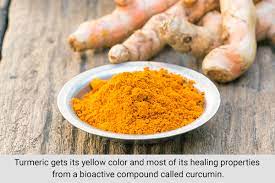Turmeric is a bright orange spice that has been used in cooking and traditional medicine for centuries. In recent years, it has become increasingly popular due to its potential health benefits. One of the most talked-about benefits is its ability to act as a blood thinner, potentially reducing the risk of blood clots. In this blog post, we’ll explore how turmeric’s active ingredient, curcumin, can reduce the risk of blood clotting and the importance of consulting a doctor before adding turmeric to your diet.
What is turmeric?
Turmeric is a spice that has been used in traditional Indian medicine for centuries. It is a popular ingredient in many dishes, particularly curries, and it has a distinct yellow color that comes from its main active ingredient, curcumin. Curcumin has powerful antioxidant and anti-inflammatory properties, and it is the key to turmeric’s health benefits.
But what about turmeric as a blood thinner? Can it really help reduce the risk of blood clots and other complications associated with high cholesterol or heart disease?
The answer is yes! Studies have shown that curcumin can act as an anticoagulant and can help prevent the formation of blood clots. This means that it can help reduce the risk of stroke, heart attack, and other complications associated with poor circulation.
In addition, research has also suggested that curcumin can help lower cholesterol levels and reduce inflammation in the arteries. These two factors are important when it comes to maintaining good cardiovascular health.
So, if you’re looking for a natural way to improve your heart health, consider adding turmeric to your diet. Just remember to consult your doctor before taking any supplements, as they can interact with certain medications.
What are the benefits of turmeric?
Turmeric, or curcumin, is a popular natural remedy that has been used for centuries as a healing herb and spice. It has numerous medicinal benefits, including its ability to act as a blood thinner. This means that it can help reduce the risk of blood clotting, which can be a serious health concern.
Curcumin, the active ingredient in turmeric, has been found to decrease platelet aggregation and promote fibrinolysis, both of which are important for preventing blood clots. It can also reduce inflammation and oxidation, which helps prevent plaque buildup in the arteries that can cause heart attack and stroke.
In addition to reducing the risk of blood clots, turmeric has many other beneficial properties. It is known to be an anti-inflammatory, antioxidant, antiseptic, and antimicrobial agent. It can help improve digestion, reduce pain, boost immunity, and protect against cancer. It is also believed to have anti-aging effects on the body.
Turmeric is easy to find and is available in supplements, powders, and as an ingredient in many foods. Taking a daily dose of turmeric is one way to help reduce the risk of blood clots and other medical conditions. Be sure to speak with your doctor about adding turmeric to your diet to ensure that it is safe for you.
How does turmeric work as a blood thinner?
Turmeric is a powerful spice that has been used for centuries for its medicinal properties. In recent years, it has become popular for its ability to act as a blood thinner. Turmeric contains a compound called curcumin, which has been linked to reducing the risk of blood clotting.
Curcumin is an active component of turmeric, and it has been found to interact with certain enzymes in the body that are responsible for the formation of blood clots. When curcumin is taken orally, it can inhibit these enzymes, thus reducing the risk of forming a clot.
In addition to inhibiting enzymes, curcumin has also been found to reduce inflammation, which can lead to the formation of clots. By reducing inflammation, curcumin helps to keep the blood flowing smoothly and efficiently. It has also been found to reduce the levels of harmful cholesterol in the blood, thus improving overall heart health.
It is important to note that turmeric is not a substitute for medical treatment. If you have any concerns about your blood clotting risk or other medical conditions, speak to your doctor before using turmeric as a supplement. While curcumin can reduce the risk of blood clots, it is not a miracle cure and it should not be used as a substitute for medical care.
Are there any side effects of turmeric?
Turmeric has long been used in traditional medicine for its powerful anti-inflammatory and antioxidant properties. But, can turmeric also act as a blood thinner? The short answer is yes, turmeric does have some potential to act as a blood thinner.
Curcumin, the active ingredient in turmeric, has been shown to reduce the risk of blood clotting by reducing inflammation and increasing levels of nitric oxide, which helps to relax and widen the blood vessels. This helps to reduce the risk of clots forming within the arteries and veins.
While turmeric may help reduce the risk of clotting, it is important to note that taking too much can increase the risk of bleeding. People with a history of bleeding disorders or who are taking other medications should consult their doctor before taking any turmeric supplements. Also, anyone with liver or kidney disease should avoid taking high doses of turmeric as it may worsen these conditions.
In general, turmeric is safe to consume as a spice in your food or as a supplement. However, it is important to speak to your doctor before taking any supplement to ensure that it is right for you and won’t interact with any other medications you may be taking.
How can I add turmeric to my diet?
Adding turmeric to your diet is a great way to get the benefits of curcumin and reduce your risk of blood clotting. Turmeric is easy to incorporate into your meals and can be used in a variety of ways. Here are some tips for adding turmeric to your diet:
1. Spice Up Your Salads: Adding a teaspoon of turmeric to your salads or dressings can provide a unique flavor as well as health benefits.
2. Use It in Soups: Turmeric can be added to soups for a more robust flavor as well as for its anti-inflammatory properties.
3. Make a Turmeric Tea: To make turmeric tea, simply boil one teaspoon of ground turmeric in two cups of water. Let it simmer for 10 minutes before straining and adding honey and lemon to taste.
4. Add It to Smoothies: Blend a teaspoon of turmeric into your favorite smoothie recipe for a boost of flavor and nutritional benefits.
5. Enjoy a Golden Milk Latte: Mix one teaspoon of turmeric with milk and honey to make an immune-boosting drink. Add cinnamon, ginger, and/or black pepper to enhance the flavor.
By adding turmeric to your meals, you can reap the rewards of its anti-inflammatory, antioxidant, and blood-thinning effects. Be sure to consult your healthcare provider about your individual needs before incorporating turmeric into your diet.



